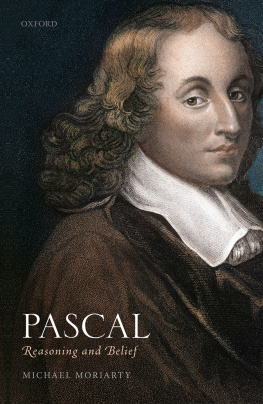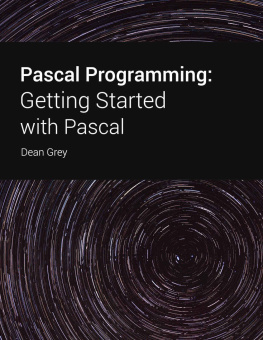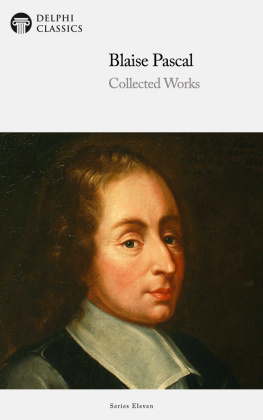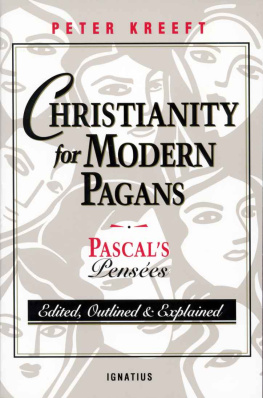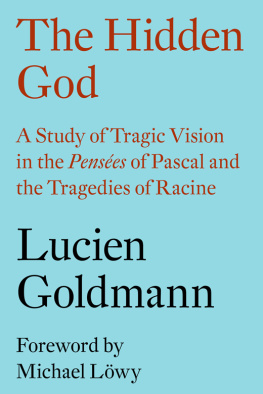Pascal Blaise - Pensees
Here you can read online Pascal Blaise - Pensees full text of the book (entire story) in english for free. Download pdf and epub, get meaning, cover and reviews about this ebook. genre: Science. Description of the work, (preface) as well as reviews are available. Best literature library LitArk.com created for fans of good reading and offers a wide selection of genres:
Romance novel
Science fiction
Adventure
Detective
Science
History
Home and family
Prose
Art
Politics
Computer
Non-fiction
Religion
Business
Children
Humor
Choose a favorite category and find really read worthwhile books. Enjoy immersion in the world of imagination, feel the emotions of the characters or learn something new for yourself, make an fascinating discovery.
- Book:Pensees
- Author:
- Genre:
- Rating:5 / 5
- Favourites:Add to favourites
- Your mark:
- 100
- 1
- 2
- 3
- 4
- 5
Pensees: summary, description and annotation
We offer to read an annotation, description, summary or preface (depends on what the author of the book "Pensees" wrote himself). If you haven't found the necessary information about the book — write in the comments, we will try to find it.
Pensees — read online for free the complete book (whole text) full work
Below is the text of the book, divided by pages. System saving the place of the last page read, allows you to conveniently read the book "Pensees" online for free, without having to search again every time where you left off. Put a bookmark, and you can go to the page where you finished reading at any time.
Font size:
Interval:
Bookmark:
The Project Gutenberg EBook of Pascal's Penses, by Blaise Pascal
This eBook is for the use of anyone anywhere at no cost and with
almost no restrictions whatsoever. You may copy it, give it away or
re-use it under the terms of the Project Gutenberg License included
with this eBook or online at www.gutenberg.org
Title: Pascal's Penses
Author: Blaise Pascal
Release Date: April 27, 2006 [EBook #18269]
Language: English
*** START OF THIS PROJECT GUTENBERG EBOOK PASCAL'S PENSES ***
Produced by John Hagerson, LN Yaddanapudi, Juliet Sutherland
and the Online Distributed Proofreading Team at
http://www.pgdp.net
INTRODUCTION BY
T. S. ELIOT
A Dutton Paperback
New York
E. P. DUTTON & CO., INC.
This paperback edition of
"Pascal's Penses"
Published 1958 by E. P. Dutton & Co., Inc.
All rights reserved. Printed in the U. S. A.
SBN 0-525-47018-2
It might seem that about Blaise Pascal, and about the two works on which his fame is founded, everything that there is to say had been said. The details of his life are as fully known as we can expect to know them; his mathematical and physical discoveries have been treated many times; his religious sentiment and his theological views have been discussed again and again; and his prose style has been analysed by French critics down to the finest particular. But Pascal is one of those writers who will be and who must be studied afresh by men in every generation. It is not he who changes, but we who change. It is not our knowledge of him that increases, but our world that alters and our attitudes towards it. The history of human opinions of Pascal and of men of his stature is a part of the history of humanity. That indicates his permanent importance.
The facts of Pascal's life, so far as they are necessary for this brief introduction to the Penses, are as follows. He was born at Clermont, in Auvergne, in 1623. His family were people of substance of the upper middle class. His father was a government official, who was able to leave, when he died, a sufficient patrimony to his one son and his two daughters. In 1631 the father moved to Paris, and a few years later took up another government post at Rouen. Wherever he lived, the elder Pascal seems to have mingled with some of the best society, and with men of eminence in science and the arts. Blaise was educated entirely by his father at home. He was exceedingly precocious, indeed excessively precocious, for his application to studies in childhood and adolescence impaired his health, and is held responsible for his death at thirty-nine. Prodigious, though not incredible stories are preserved, especially of his precocity in mathematics. His mind was active rather than accumulative; he showed from his earliest years that disposition to find things out for himself, which has characterised the infancy of Clerk-Maxwell and other scientists. Of his later discoveries in physics there is no need for mention here; it must only be remembered that he counts as one of the greatest physicists and mathematicians of all time; and that his discoveries were made during the years when most scientists are still apprentices.
The elder Pascal, tienne, was a sincere Christian. About 1646 he fell in with some representatives of the religious revival within the Church which has become known as Jansenismafter Jansenius, Bishop of Ypres, whose theological work is taken as the origin of the movement. This period is usually spoken of as the moment of Pascal's "first conversion." The word "conversion," however, is too forcible to be applied at this point to Blaise Pascal himself. The family had always been devout, and the younger Pascal, though absorbed in his scientific work, never seems to have been afflicted with infidelity. His attention was then directed, certainly, to religious and theological matters; but the term "conversion" can only be applied to his sistersthe elder, already Madame Prier, and particularly the younger, Jacqueline, who at that time conceived a vocation for the religious life. Pascal himself was by no means disposed to renounce the world. After the death of the father in 1650 Jacqueline, a young woman of remarkable strength and beauty of character, wished to take her vows as a sister of Port-Royal, and for some time her wish remained unfulfilled owing to the opposition of her brother. His objection was on the purely worldly ground that she wished to make over her patrimony to the Order; whereas while she lived with him, their combined resources made it possible for him to live more nearly on a scale of expense congenial to his tastes. He liked, in fact, not only to mix with the best society, but to keep a coach and horsessix horses is the number at one time attributed to his carriage. Though he had no legal power to prevent his sister from disposing of her property as she elected, the amiable Jacqueline shrank from doing so without her brother's willing approval. The Mother Superior, Mre Angliqueherself an eminent personage in the history of this religious movementfinally persuaded the young novice to enter the order without the satisfaction of bringing her patrimony with her; but Jacqueline remained so distressed by this situation that her brother finally relented.
So far as is known, the worldly life enjoyed by Pascal during this period can hardly be qualified as "dissipation," and certainly not as "debauchery." Even gambling may have appealed to him chiefly as affording a study of mathematical probabilities. He appears to have led such a life as any cultivated intellectual man of good position and independent means might lead and consider himself a model of probity and virtue. Not even a love-affair is laid at his door, though he is said to have contemplated marriage. But Jansenism, as represented by the religious society of Port-Royal, was morally a Puritan movement within the Church, and its standards of conduct were at least as severe as those of any Puritanism in England or America. The period of fashionable society, in Pascal's life, is however, of great importance in his development. It enlarged his knowledge of men and refined his tastes; he became a man of the world and never lost what he had learnt; and when he turned his thoughts wholly towards religion, his worldly knowledge was a part of his composition which is essential to the value of his work.
Pascal's interest in society did not distract him from scientific research; nor did this period occupy much space in what is a very short and crowded life. Partly his natural dissatisfaction with such a life, once he had learned all it had to teach him, partly the influence of his saintly sister Jacqueline, partly increasing suffering as his health declined, directed him more and more out of the world and to thoughts of eternity. And in 1654 occurs what is called his "second conversion," but which might be called his conversion simply.
He made a note of his mystical experience, which he kept always about him, and which was found, after his death, sewn into the coat which he was wearing. The experience occurred on 23 November, 1654, and there is no reason to doubt its genuineness unless we choose to deny all mystical experience. Now, Pascal was not a mystic, and his works are not to be classified amongst mystical writings; but what can only be called mystical experience happens to many men who do not become mystics. The work which he undertook soon after, the Lettres crites un provincial, is a masterpiece of religious controversy at the opposite pole from mysticism. We know quite well that he was at the time when he received his illumination from God in extremely poor health; but it is a commonplace that some forms of illness are extremely favourable, not only to religious illumination, but to artistic and literary composition. A piece of writing meditated, apparently without progress, for months or years, may suddenly take shape and word; and in this state long passages may be produced which require little or no retouch. I have no good word to say for the cultivation of automatic writing as the model of literary composition; I doubt whether these moments
Font size:
Interval:
Bookmark:
Similar books «Pensees»
Look at similar books to Pensees. We have selected literature similar in name and meaning in the hope of providing readers with more options to find new, interesting, not yet read works.
Discussion, reviews of the book Pensees and just readers' own opinions. Leave your comments, write what you think about the work, its meaning or the main characters. Specify what exactly you liked and what you didn't like, and why you think so.



